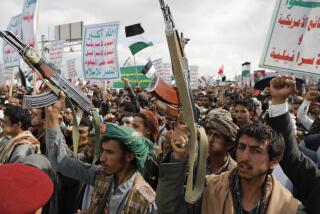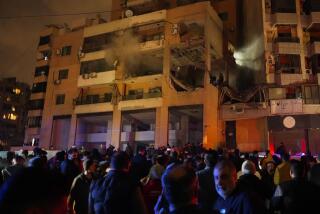Beleaguered Yemeni leader has shown staying power
- Share via
Reporting from Cairo and Sana, Yemen — Having endured wars, rebellions and an ongoing battle with Al Qaeda, Yemeni President Ali Abdullah Saleh may not be easily toppled from power by the bloodshed and protests inspired by the unrest that brought down the leaders of Egypt and Tunisia.
Saleh has spent the last 32 years co-opting and outflanking his enemies in an impoverished nation that often seems a gunshot away from implosion. Two weeks of daily demonstrations, which have grown more violent and widespread in recent days, have shaken his inner circle but have not dented his aplomb.
The pressure on the 64-year-old president is enormous: Tens of thousands of protesters clamoring in the streets, a secessionist movement in the south, rebels in the north, restive tribes and, unlike most Arab nations, a highly active Al Qaeda affiliate hunkered in rugged tribal lands stretching from the Gulf of Aden to the Saudi Arabian border. Nearly every day brings fresh bloodshed and funeral processions.
Opposition and clan leaders have called for a “day of rage” Tuesday that is expected to draw more than 100,000 demonstrators to the capital, Sana, and other key cities. Protesters are seeking political reform and job opportunities in a nation where nearly half the population earns less than $2 a day. The new rally comes as Saleh’s concession to form a national unity government has so far been rejected by the main opposition group, the Joint Meeting Parties.
Saleh is going to “do something that diverts people’s attention, or that changes the conversation on the street,” predicted Bisam Hamani, a schoolteacher. “I don’t know what, but you have to be crazy to think this president won’t think of something. He always does…. He knows exactly what each group’s weakness is.”
Although Washington has long been wary of Saleh, the U.S. is concerned that his ouster would embolden Islamist militants to expand their reach from the Arabian Peninsula to the Horn of Africa. American forces and weapons have assisted Saleh’s military and intelligence agencies with targeting Al Qaeda operatives.
The Al Qaeda wing in Yemen claimed responsibility for October’s failed attempt to detonate concealed bombs on airplanes over the U.S. It has also dispatched some of its fighters to join the ranks of Islamist militants in Somalia, which was the base for launching deadly bombings last year in Uganda.
In the face of these dangers, Saleh is increasingly preoccupied with keeping control of what is one of the poorest countries in the world. Much of his energy is spent not on quelling the furor between dueling pro- and anti-government protesters but on manipulating the shifting alliances among tribes, including his own, that are the key to his power.
“The tribes do not have clear-cut loyalties,” said Hafez Bukari, director of the Yemen Polling Center. “In the past, Saleh has depended on three parts of society — military, security and tribes — for his power, and in the past, that made sense. But now he cannot rely on the tribes to be with him.”
This was apparent recently when tribal leader Sheik Hussein Ahmar, whose nine brothers have prominent roles in the nation’s politics, publicly defected from the ruling General People’s Congress party. The move may prompt more tribal leaders to call for the president’s resignation. Ten other members of parliament quit the ruling party in the last week.
Ahmar, whose brother Sadiq is head of Yemen’s largest tribal confederation, has been a longtime critic of Saleh and has been competing with the president for tribal loyalties in Yemen’s north.
Both men have been meeting with tribal leaders and handing out cars, cash and favors for allegiance, according to local press reports. Another of Sheik Hussein Ahmar’s brothers, Hamid, also a leading opposition figure, has not yet called for Saleh to step down, but said in an interview that if the president didn’t capitulate to opposition demands this week, “it will be big. Very big.”
Such ominous language echoes through protests, tribal meetings and even presidential asides. Saleh has warned that he will oppose protests “with every drop of blood.” This is largely rhetoric in a country where village men rarely leave home without guns and daggers, but it indicates a widening gap between the president and the clans.
Saleh’s political survival has for decades been predicated on his wiles. His public institutions are weak and reviled. Nepotism runs deep; his son, half brother and nephews hold key military and intelligence posts. And, unlike Persian Gulf states such as Saudi Arabia and Oman that recently gave their citizens job offers and cash payouts to stem unrest, Saleh doesn’t have the money to appease a country where many are malnourished.
His lack of vision outside of preserving his family and his corrupt party’s power has stunted economic and political reform in a country with scarce oil reserves and dwindling water supplies. This failure has prompted tens of thousands of students and other young people to take to the streets and demand a new president. The question is whether Saleh can successfully use his political skills when so much around him cannot be fixed by speeches and whispered deals.
“Saleh has managed to play his enemies off one another very successfully for many years, but I think his time is over, not because he is not intelligent or cunning enough, but because of the way he has built his power around himself and his family members,” said Abdullah Faqih, a political science professor at Sana University.
“He simply can’t make any concessions because all the power is concentrated on him, and his family,” Faqih said. “He either has to give up everything, or can give up nothing.”
As tensions rose in Yemen, violent demonstrations continued for a third day in neighboring Oman. Protesters calling for economic and government reform burned a supermarket and a police station.
Sultan Qaboos bin Said has offered to create 50,000 government jobs and pay the unemployed $390 a month. But those concessions have yet to quell the anger inspired by demonstrations across the region.
Times staff writer Fleishman reported from Cairo and special correspondent Edwards from Sana.
More to Read
Sign up for Essential California
The most important California stories and recommendations in your inbox every morning.
You may occasionally receive promotional content from the Los Angeles Times.











